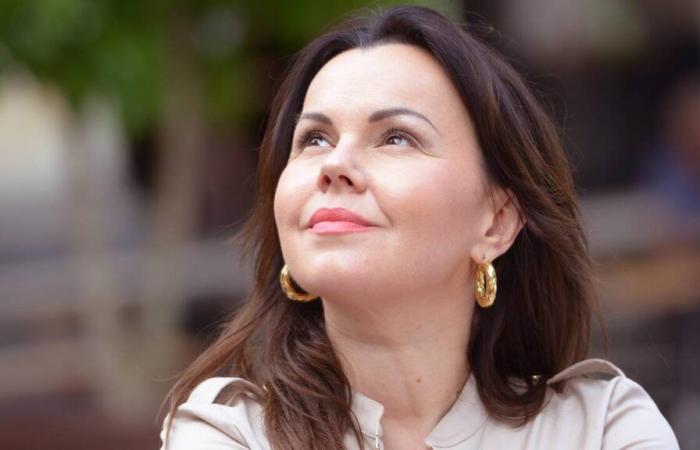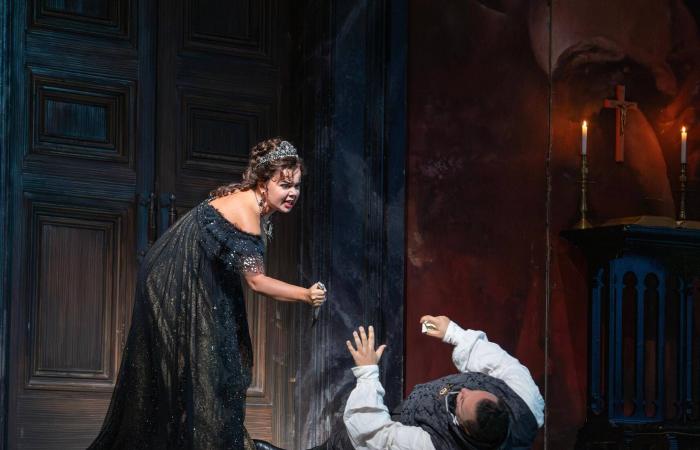Her husband, tenor Roberto Alagna, follows the same instructions. This does not mean that she chose, after a first baritone husband, to share her existence with opera artists. “Life has taken care of my choices. Studies, meetings on stage and the work environment fulfilled me on all levels. » Together since 2012, and parents of little Malena aged 10, the Polish soprano and the French tenor will meet again in December on the stage of the Grand Théâtre de Genève where Aleksandra Kurzak will play Fedora for the first time, the title role of Umberto Giordano’s opera. Roberto Alagna will be Count Loris Ipanov, whom he has already portrayed once.
Sharing the stage as a couple can seem risky. Not for them, each having their own temperament and not interfering in the other’s game. “We prepare separately and never talk about our work at home or on stage, except sometimes sharing impressions about the production, for example. » “We don’t need each other’s advice. Our characters are too different. I am whole, direct and frontal. Sometimes explosive. Roberto calls me his Etna. He is more nuanced and diplomatic. On set, everyone dives into their role absolutely. We are the characters, we do not interpret them. Roberto is very creative, artistic, imaginative, and I am more concrete, organized and strong. » Their different relationship to singing also comes from their experience and their life journey. “Roberto has singing in his blood. He was born into a family of amateur singers. Accessing the stage and making it his profession is like a miracle for him. He considers lyrical art to be something divine. For my part, I grew up in an environment of professional artists and musicians. It was my daily life. I always wanted to go on stage, it was normal for me. »
Aleksandra Kurzak has indeed been swimming in the musical bath since before she was born. Her mother is an excellent singer and her father is a horn player. They both work in Poland, at the Wrocław Opera. Today, his father teaches at the Music Academy. The two musicians support, accompany, encourage and let their little daughter’s precocious talents express themselves while protecting her from the pitfalls of the profession.
At the age of 7, Aleksandra began playing the violin, which she practiced for a dozen years, as well as the piano. This instrumental training offers him additional assets to support his natural vocal qualities. The child follows his parents to the opera, frolics backstage and attends rehearsals. Curious and passionate, she pulls out all the stops. “I collected the jewelry that had fallen from the costumes on the set and I then reproduced the shows and everything I heard at home. I lived in a wonderful universe. »
She sings as she breathes. Everyone agrees that he has an incredible disposition. But the elders watch over their only daughter. One evening, the conductor of a concert where Aleksandra’s mother was singing hears a voice singing the tunes of the show in the room adjoining the hotel. When he learns that it is a child, he is stunned and immediately offers to have her record a record.
But the parents are opposed to it to avoid a career as a child prodigy which could harm his development, both personal and artistic. Aleksandra will perhaps do this job one day but there is no hurry, she will have a “normal” life.
She studied at the Wrocław Academy and the Hamburg Hochschule, then spent seven years in the German city’s opera troupe. Her mother teaches her everything and coaches her well. “She was an excellent teacher. One event had a big impact on her: when I was born a month prematurely and the doctors told her that I might not live, she prayed that her voice would be taken if that could save me. After I was born, she couldn’t sing for two years. She rebuilt herself step by step before returning to the stage. This experience deepened his pedagogy. I owe everything to him and to my father. » The role of Suzanne in The Marriage of Figaro, by Mozart, launched the career of the young singer, who found herself alongside her mother playing the Countess in the same work. It was in her town of, and Aleksandra was 21 years old. She then explored Mozart, baroque music, bel canto and light or spicy roles at the Hamburg Opernstudio where she opened her vocal palette. In this repertory house, which displays one or several titles daily, the young woman forges her lyrical culture, her voice and her feeling of belonging to a musical community. Among the titles that marked his career, Donizetti’s L’elisir d’amore holds a special place. It was in a 2012 London production that she met Roberto Alagna. “I was obviously very intimidated to sing with a star of his fame, but when we stood on stage it clicked immediately. And in a completely natural way. »
The potion works and the couple then performs regularly together, with the same concern for clarity of pronunciation. “Roberto’s is legendary, and I am very sensitive to this dimension.
Purity of diction is easier for men, because the articulation of words vibrates better in the medium and low registers. In head voice, in the treble, we lose clarity. It is therefore a question of balancing the registers between the brilliance and tension of the high notes, and the roundness and width of the lower ones. »
As time passes, tone and technique deepen, dramatic roles multiply. The singer finds herself today at her best in the tragic destinies of sacrificed women, with Puccini as her chosen composer, of whom she recorded a disc of arias with her husband in 2018: Puccini in Love. Among his favorite roles, Violetta from La Traviata, Tosca, Butterfly, and Liù in Turandot, in particular, enchant him. “I love dying on stage. At this moment, the music reaches an heightened intensity and beauty. This gives a feeling of incredible power, which one can only experience in this situation, every night of performance. And then rising from death to live again is something fabulous! »
As for these destinies of women tortured by feelings and fate, “they in fact draw a fairly accurate portrait of the female capacity to reach the end of oneself”. For her new role in Geneva, she obviously needs more time than for works that she knows, having heard or sung them extensively. She began working on Fedora in September, score in hand, and she listens to it diligently to familiarize herself with the work. Three months of impregnation are not too long to get into the character, knowing each note, inflection and intention by heart, while accompanying yourself on the piano. The relationship between text and music is essential. “I speak five languages and find that you cannot truly embody a character well without knowing the language and culture. This is fundamental for the clarity and accuracy of dramatic interpretation. I am looking forward to singing soon with the Orchester de la Suisse Romande after the piano rehearsals, because the instrumental part is very large in this opera. The writing is carnal, intense, lyrical and expressive. I will only be able to truly find my place at that moment. »
As for history, it fascinates her. “This deceived woman who ends up loving the murderer of the man who was to be her husband, and commits suicide upon learning of the deaths she caused, out of revenge and ignorance, is terrible. I am falling in love with this opera and its heroine. »
French and Genevan, journalist and piano graduate at the Neuchâtel Conservatory, Sylvie Bonier taught the instrument in Geneva and collaborated on various publications and radio stations in France, as well as on Espace 2. For 40 years she provided the musical chronicle of the Geneva Tribune then Tempswith which she continues to collaborate occasionally.
Fedora at the Grand Théâtre de Genève
From December 12 to 22, 2024
Site
Ticketing







